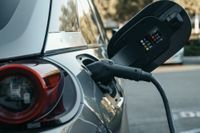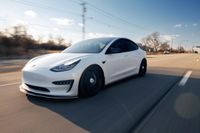Volkswagen Struggles to Catch Up in the Electric Vehicle Race
Volkswagen, once poised to overtake Tesla as the leading manufacturer of battery-powered vehicles, is still far behind in the electric vehicle race. The company is also facing tough competition from Chinese automakers, especially in China, its largest market. Volkswagen's internal remarks suggest that the company is no longer competitive and is in need of drastic changes to secure its future. Despite its ambitious plans and investments, Volkswagen is lagging behind due to high costs, low productivity, and technological gaps. However, experts believe that the company still has the potential to bounce back.

Volkswagen Falls Behind in the Electric Vehicle Race
When Volkswagen announced its electric future several years ago, it had the potential to surpass Tesla as the leading manufacturer of electric vehicles. However, it has failed to achieve this goal and is selling fewer electric vehicles than its competitors, especially in China. The company's sales are forecasted to shrink in the Chinese market, where EV sales are expected to grow by more than a quarter in 2023.
Volkswagen currently sits in the eighth position in China's fast-growing electric car market, with a market share of only 3.3%. BYD holds the top spot with 25%, followed by Tesla with 15%. This shows that Volkswagen has fallen behind in the battery electric vehicle race, particularly in China, which is its largest market.
Investor enthusiasm about Volkswagen's EV ambitions quickly turned to skepticism when it became evident that the company was struggling to execute its plans. The company's stock price has been declining, and it is facing challenges in terms of costs, productivity, and market competitiveness.
Challenges and Setbacks for Volkswagen
Volkswagen is facing various challenges and setbacks that have hindered its ability to lead in the electric vehicle market. The "Dieselgate" scandal in 2015, where Volkswagen admitted to rigging emissions tests, severely affected the company's reputation and led to significant financial penalties. This event caused Volkswagen to become more cautious and slow-moving in terms of compliance and innovation.
The company's size and legacy also pose challenges. Being an established business with numerous factories and employees worldwide, Volkswagen has struggled to keep up with the fast-paced and rapidly evolving electric vehicle market. It takes longer for the company to develop and bring new electric vehicles to market compared to newer and more agile competitors.
Moreover, Volkswagen's technological gaps, particularly in software development, have affected its competitiveness. Glitches and delays in software fixes have undermined the company's reputation. While Volkswagen has made efforts to address these issues, it still lags behind industry leaders. The company is partnering with local Chinese carmakers to enhance its technology and expand its product range.
The Path to Recovery for Volkswagen
To recover from its setbacks and become a major player in the electric vehicle market, Volkswagen needs to close the technology gap, reduce costs, and improve productivity. The company aims to achieve a 50% share of electric vehicle sales by 2030, but it will require significant efforts and investments.
Volkswagen's battery strategy is also a crucial factor in its recovery. The company is investing billions to build its own batteries, which will help reduce production costs. However, the success of this strategy depends on getting the battery cell technology right.
Despite its challenges, Volkswagen still has strengths that can contribute to its recovery. The company's resources, global brand recognition, and extensive brand portfolio across different markets and price points provide opportunities to regain competitiveness. Experts believe that Volkswagen has the potential to bounce back, but it will require bold and effective actions to secure its future in the electric vehicle race.


